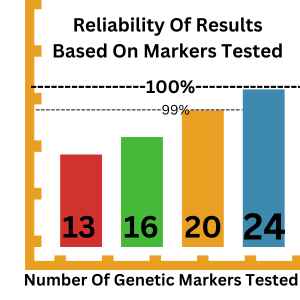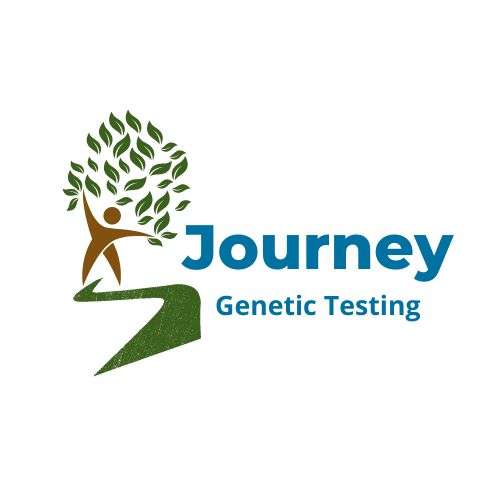Avuncular DNA Test
Avuncular DNA Testing
Our Avuncular DNA test is often called an Aunt or Uncle test. This kind of DNA test is frequently used when it’s not possible for the father to undergo a paternity test. The easiest way to collect a DNA sample involves gently rubbing a cotton swab against the inside of the cheek. This is where the cells containing DNA for this test are located. It is fast and painless.
DNA testing has been helpful in bringing together families. It can also answer questions about heritage. Legal avuncular DNA testing helps resolve legal issues. Whether for personal curiosity or legal purposes, avuncular DNA testing offers vital insights into the complexities of family relationships.
We use a process that compares the DNA of a possible niece or nephew with those of their possible aunt or uncle. The testing examines genetic markers, which are specific regions of your DNA. These markers vary from person to person and help identify genetic similarities or differences between the child and the alleged aunt or uncle.
The more genetic markers that two people have in common, the more likely that have a biological relationship.
What An Avuncular DNA Test Will Prove
If the DNA report shows they are related, then their brother is the biological father of the child. Aunt-Uncle testing can also be used to determine the identity of a child’s mother. This is especially useful in situations where the child was adopted or was missing and has been located. A maternal avuncular test would use a full brother or sister of the mother, using the same process as with the father. The DNA report will also show if they are not related. Either way, the results will provide clarity and reassurance to anyone taking it.
Our Aunt-Uncle testing can also be used to prove maternity for a child who was adopted, or was missing. A maternal avuncular test would use a full brother or sister of the suspected mother, using the same process.
Avuncular testings can only be done with the alleged parent’s full brother or sister. If only a half-sibling of the possible parent is available, you may want to consider a Genetic Reconstruction DNA test instead. You learn more about this option by clicking on Genetic Reconstruction.
How Accurate Is An Aunt-Uncle DNA Test ?
Aunt-Uncle DNA testing, like grandparent and sibling DNA tests, rely on statistical probabilities. These probabilities will show if the two or more people are related through bloodlines. The accuracy of any avuncular DNA test depends on the number of genetic markers analyzed. The other important factor is the laboratory’s expertise.
We guarantee the most accurate Avuncular DNA test available. Click here to learn why we can make this commitment.
The DNA industry standard for DNA testing of this type compares only 16–20 alleles (aka genetic markers). We believe that only meeting the minimum standard is insufficient to perform accurate testing. This is because there is simply not enough DNA being tested to allow us to feel confident about the results. For example, when only 16–20 markers are being considered in the testing process, the majority of cases show inconclusive results.
Why Journey Genetic Testing Is Different

Journey Genetic Testing performs Avuncular DNA testing with 24 genetic marker (aka loci) as part of our procedural standards. The additional 4 loci tested will increase the strength of the findings by over 800%. If we cannot reach a conclusive result with our standard 24 markers, we will automatically examine additional markers, which may include combining X or Y Chromosome testing. You will not have any added costs if we have to look at more markers.
We can, in almost every case, reach a conclusive result with just one aunt/uncle and one niece/nephew. However, we do suggest that, if possible, you include the niece or nephew’s mother’s DNA sample. You won’t incur an additional fee for testing a mother’s DNA sample when it’s included with the other DNA samples. If the mother is not available to provide a DNA sample, we will still perform the testing, and may increase the markers if necessary.
Experienced Ph.D.’s Always Review Your Results
We take accuracy seriously, so we test all DNA specimens twice. Once the report is complete, a Ph.D. expert reviews and signs it. We never send test results without this review. We’ll send your results to you through email in a .PDF format, and you can print them if you’d like. In nearly 99.5% of situations, we finish all the testing and deliver the results in only two business days.
Reasons You Might Need An Avuncular Test
- Peace of mind – Sometimes you might wonder about your family connections. A relationship DNA test can help you feel calm and clear about things. The test will show if a niece or nephew is truly related to an aunt or uncle.
- Adoption or surrogacy situations – Sometimes, when adoption or surrogacy happens, it’s not easy to know where a child comes from. An avuncular DNA test can help figure out if someone is a potential aunt or uncle. It can also tell important things about a child’s genes.
- Medical reasons – If a child needs a special transplant to save their life, there might be aunts or uncles who could help. They could be good donors.
- Legal reasons – When there are arguments about things like money or who gets what after someone passes away, knowing if you’re really related to an aunt or uncle can be important. The test results can also serve as evidence in a court to demonstrate whether you are truly related or not.
How Much Does An Aunt-Uncle DNA Test Cost?
We understand how import the answers you get are to you. Journey Genetic Testing is committed to delivering the best quality, and ensuring 100% accuracy in our DNA testing results. We want to make available to you, at the most affordable prices, this DNA service.
Avuncular tests, when not needed for legal purposes, are typically available and usually cost between $300 to $500 for each test. Honestly, that’s quite expensive. There’s really no good reason for such high prices. We perform all our testing in a lab accredited by AABB, an organization highly regarded in the field.
| Number Of People Testing |
| Child & Uncle or Aunt – $129.00 |
| Child, Mother, Aunt or Uncle – $129.00 |
| Each Additional Aunt Or Uncle – $100.00 |
| Each Additional Child – $75.00 |
| Each Non-Standard Sample – $100.00 |
Other Relationship DNA Tests
There are other DNA tests to verify a relationship if an aunt-uncle test is not right for you. A sibling DNA test can determine if participants are full-siblings or half-siblings, or are not siblings at all. A grandparent DNA test is often possible when one or both of the father’s parents are willing to undergo testing. In cases where those involved are only male, you might consider a Y-Chromosome test. Opting for this test may yield a more robust outcome compared to an aunt or uncle test. Additionally, the result of this test will be a straightforward Yes-or-No response, instead of a percentage probability.
Your Avuncular DNA Test Results
Aunts, uncles, and grandparents share 25% of common DNA with their nieces, nephews or grandchildren. Parents each share 50% of their DNA with their children. This is why a direct paternity test is always a “yes” or “no” answer. An avuncular test result will show a probability range for the relationship. This probability will range from 0% to 99.9%. This is due to the suspected father’s siblings sharing half of his genetic makeup.
Most Often Asked Questions About Aunt-Uncle DNA Testing
An Aunt – Uncle DNA test will provide you with an accurate statistical probability of those taking the test of having a biological relationship of aunt or uncle and niece or nephew. The results of our avuncular test can conclusively prove or disprove the paternity of a brother or sister of the aunt or uncle participating in the test.
People choose an avuncular DNA test is to establish paternity when the suspected biological father is unavailable. This can be due to reasons such as his passing, being in prison, or refusing to undergo regular DNA testing.
Determining paternity can be a critical help in many situations. These include custody and child support orders, inheritance claims, acquisition of Social Security survivorship benefits, and establishing a family relationship for immigration sponsorship.
The DNA collection process is very easy to do, and we provide step-by-step details in your DNA kit. We collect the DNA with an easy cheek swab. The swabs should either be a buccal swab, or a clean “Q-tip” style cotton swab. All you need to do is rub the swab up and down on the inside of the cheek to collect skin cells from the inner cheek and gums. You can find detailed instructions by clicking on “How To Collect A DNA Sample.“
We have all the DNA samples tested twice. We need to have 4 mouth swabs per person, which we will provide you (two swabs on each side of the mouth). After collecting the DNA specimen, just place the samples in the envelope we provide and place that in the prepaid return mailer. Then the samples are sent to the lab and testing begins.
After we receive all the avuncular samples at our lab, we will send you an email to let you know that the testing has started. You should anticipate receiving the results of your aunt-uncle DNA test via email within only 2 business days.
Our at home informational test provides you with a 100% accurate answer as to whether or not there is aunt/uncle relationship that exists between test participants.
If you need avuncular DNA test results that are admissible in a court of law or other agency, we can provide our AABB accredited legal aunt/uncle DNA test. The legal avuncular DNA test results have various applications, including child support cases, visitation rights, changing a name on a birth certificate, estate or probate matters, immigration cases, and more.
Whenever you can, it’s suggested the mother’s DNA sample into the child’s test. This streamlines the entire process, as it helps the lab identify and eliminates the mother’s DNA from the child’s genetic makeup. Including the mother’s DNA sample with the initial testing won’t result in any extra cost.
We determine the results by considering two key factors. The first is the number of genetic matches between the child and the alleged aunt or uncle. This results in a statistical probability of these matches occurring by chance. Secondly, we compute both of these numbers and then make a comparison to derive a percentage that indicates the likelihood. The higher the percentage of probability, the likelier it is that there is an aunt/uncle relationship. However, it’s important to remember that an avuncular test doesn’t have to demonstrate a 100 percent probability to be scientifically accurate. A result with a percentage of 91.0% or higher is regarded as conclusive.
Yes! If the participants live at different addresses, different cities, or even in different states, we can send separate DNA kits to everyone involved.
To send a second kit to a different address, simply select the “additional kits” option on your order form. Next, provide the second address in the designated section for kit delivery.
Yes. A mouth swab is what we call a standard sample. However, we acknowledge that on some occasions, it might not be feasible to furnish a mouth swab, particularly when considering discreet testing.. In certain situations, a family member may have passed away, be in prison, or just not accessible. We can test things like a toothbrush, nail clippings, ear wax, hair with the root attached, and other items. You can learn more about non-standard samples by going to Alternative DNA Samples.


